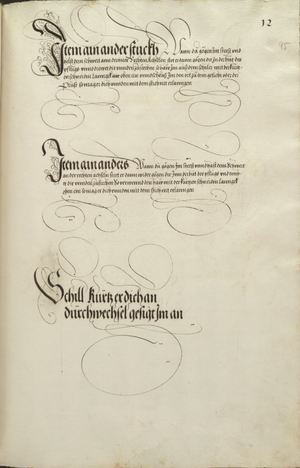|
|
You are not currently logged in. Are you accessing the unsecure (http) portal? Click here to switch to the secure portal. |
User:Kendra Brown/Latin Lew/88r
Munich 88r / PDF page 21
88r a
88r a Latin (Sandbox)
- ALIA FORMA.[*^1]
- QUUM contra hostem consistas,
- ensem dextro humero adplicatum continens;
- at is vicissim in custodia Aratri,
- atque te puncturum inferné comminatur,
- ictum tu convertas ex acie brevi,
- et porrectim superné contra hostem si direxeris,
- punctione te adpraehendere is non poterit.
88r a English (Sandbox)
- Another form [^1]
- When you would stand against the enemy,
- holding the sword close to your right upper arm:
- and HE in turn in the Plow guard,
- and he barricades you with a lower thrust,
- YOU would convert the strike from the short edge,
- and if you direct [it?] extended above against the opponent,
- HE cannot overtake you in your thrust.
88r a notes
[^1]: The author is using 'alia forma' as an alternative to 'alius habitus' from the preceding section to avoid the repetition of the German original's 'Item ein ander'
Missing Zettel verses from Dresden 95r (27)
German
- Schill Kurtz er dich an
- Durchwechsel gesigt Im an
English (Fritz)
- Squint if he is short against you,
- Durchwechseln defeats him.
88r b
88r b Latin (Sandbox)
- OBSERVATIO.
- UNDE licebit videre,
- num adversarius porrectim ensem exerceat vel minus.
- In congressu versus hostem,
- prospicias diligenter limis quasi oculis,
- num brevis sit feriundo,
- verum id[^1] eo modo deprehendas,
- si brachia non extendat in ipso ictu,
- brevis est et si in custodia consistas,
- laedere te nequibit,
- et si suo ense tuum prepedire conetur,
- eum itidem adprehendrere nequibit verum si eveniat,
- ut ex Bovis habitu laboret vel Aratri forma,
- itidem decipietur,
- denique quicquid exercuerit,
- inepta apparebunt.
- Huiusmodi Athletis se transmittas,
- eo coges, ut sese excipiendo ictus tuos tueri necesse sit,
- et tum libere quoscumque velis habitus exerceas,
- etiam cum hoste luctam inire.
88r b English (Sandbox)
- Observation.
- From whence it can be considered,
- if the adversary would practice the extended sword even less.
- In the approach against the opponent,
- you should watch diligently with a side eye as it were,
- if he would have struck short,
- truly you should seize him/it in this way,
- if he would not extend the arm in the thrust itself,
- it is short and if you should take a position in a guard,
- he will not be able to injure you,
- and if he tries to trip you up with his sword,
- truly if it happens that he in the same way can't overtake you,
- so that he works from the Ox or from the Plow posture,
- likewise, he is deceived/trapped,
- Finally, whatever he exercises,
- they are evidently foolish.
- You would send/go across this type of Athlete,
- therefore restrict/collect, in order that it is necessary to watch your strikes by intercepting themselves,
- and then you would freely practice the gesture as often as you want,
- and also when you begin wrestling with the enemy.
88r b notes
[^1]: could this "id" refer to "indes"? Also, "id" appears with "deprehendas" again on 22a and 23a
parallel construction, two attacks, included in the German parallel construction, from either of two guards, also in german
88r c
88r c Latin (Sandbox)
- Item si ad hostem concedes[^2],
- in ipso progressu,
- limis oculis observabis,
- num breviter ensem exerceat,
- idque ea ratione deprehendas,
- in conflictu si non porrexerit brachia in ipso ictu
- libere transmittes tum ictibus,
- tum vero punctionibus ex mucrone longiori,
- et ea ratione adversarius cogetur,
- ut tibi sit concessum,
- strenue contra ipsum habitus quosuis[^3] usurpare
- non citra ipsius corporis detrimentum.
88r c English (sandbox)
- Item, if you would step to the enemy,
- in this progression,
- observe the side eye,
- now briefly train/exercise the sword,
- you would discern it using this method,
- in the collision, if he does not extend arms in the thrust itself,
- next you freely send across with blows,
- then truly using a thrust from the longer sword,
- and the adversary will be rounded up using this method,
- so that it would have been permitted[^4] to you,
- seize strenuously upon this condition[^5] against whomsoever,
- no diminishment[^6] on this side of the body itself.
88r c notes
[^2]: Many dictionaries: http://logeion.uchicago.edu/index.html#concedes After looking elsewhere in PHM, I think he means some kind of step-- eg, the triangle step in the scythe section is "in triangulum concedas." Whitaker says concedas is the pres subj form of condedes (which is fut ind). [^3]: logeion has thoughts but doesn't seem to have any actual examples of quosuis: http://logeion.uchicago.edu/index.html#quosuis it does appear to be a frequent medieval latin word: https://www.google.com/search?q=%22quosuis%22&tbas=0&source=lnt&sa=X&ved=0ahUKEwi95M3by5nXAhVn04MKHSCgDjoQpwUIHw&biw=820&bih=749 [^4]: concessum-- adj. doesn't make sense to do this one as step, since then it would have to be passive (he having been stepped to you) [^5]: I don't know what to do with this one [^6]: is this even a word?
confusing habitus in line 11

